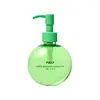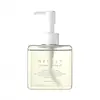What's inside
What's inside
 Key Ingredients
Key Ingredients

No key ingredients
 Benefits
Benefits

 Concerns
Concerns

 Ingredients Side-by-side
Ingredients Side-by-side

Ethylhexyl Palmitate
EmollientSorbeth-30 Tetraoleate
EmulsifyingSorbitan Sesquioleate
EmulsifyingTriethylhexanoin
MaskingCaprylic/Capric Triglyceride
MaskingPolyisobutene
Cetyl Ethylhexanoate
EmollientDiisostearyl Malate
EmollientParfum
MaskingOlea Europaea Fruit Oil
MaskingSolanum Lycopersicum Seed Oil
EmollientMelia Azadirachta Leaf Extract
Skin ConditioningMelia Azadirachta Flower Extract
Skin ConditioningCoccinia Indica Fruit Extract
Skin ConditioningAmber Powder
Solanum Melongena Fruit Extract
Skin ConditioningCurcuma Longa Root Extract
MaskingOcimum Sanctum Leaf Extract
Skin ConditioningArgania Spinosa Kernel Oil
EmollientAvena Sativa Kernel Oil
Skin ConditioningCarthamus Tinctorius Seed Oil
MaskingCitrus Junos Fruit Oil
MaskingHelianthus Annuus Seed Oil
EmollientPersea Gratissima Oil
Skin ConditioningPunica Granatum Seed Oil
EmollientPyrus Malus Seed Oil
EmollientRubus Chamaemorus Seed Oil
Skin ConditioningSimmondsia Chinensis Seed Oil
EmollientVitis Vinifera Seed Oil
EmollientCorallina Officinalis Extract
Skin ConditioningMoringa Oleifera Seed Oil
EmollientSalicylic Acid
MaskingSolanum Lycopersicum Fruit Water
MaskingCamellia Japonica Seed Oil
EmollientLinum Usitatissimum Seed Oil
PerfumingButylene Glycol
Humectant1,2-Hexanediol
Skin ConditioningSolanum Lycopersicum Fruit Juice
Skin ConditioningHydroxyacetophenone
AntioxidantChamomilla Recutita Flower Oil
MaskingEthylhexyl Palmitate, Sorbeth-30 Tetraoleate, Sorbitan Sesquioleate, Triethylhexanoin, Caprylic/Capric Triglyceride, Polyisobutene, Cetyl Ethylhexanoate, Diisostearyl Malate, Parfum, Olea Europaea Fruit Oil, Solanum Lycopersicum Seed Oil, Melia Azadirachta Leaf Extract, Melia Azadirachta Flower Extract, Coccinia Indica Fruit Extract, Amber Powder, Solanum Melongena Fruit Extract, Curcuma Longa Root Extract, Ocimum Sanctum Leaf Extract, Argania Spinosa Kernel Oil, Avena Sativa Kernel Oil, Carthamus Tinctorius Seed Oil, Citrus Junos Fruit Oil, Helianthus Annuus Seed Oil, Persea Gratissima Oil, Punica Granatum Seed Oil, Pyrus Malus Seed Oil, Rubus Chamaemorus Seed Oil, Simmondsia Chinensis Seed Oil, Vitis Vinifera Seed Oil, Corallina Officinalis Extract, Moringa Oleifera Seed Oil, Salicylic Acid, Solanum Lycopersicum Fruit Water, Camellia Japonica Seed Oil, Linum Usitatissimum Seed Oil, Butylene Glycol, 1,2-Hexanediol, Solanum Lycopersicum Fruit Juice, Hydroxyacetophenone, Chamomilla Recutita Flower Oil
Ethylhexyl Palmitate
EmollientSorbeth-30 Tetraoleate
EmulsifyingTriethylhexanoin
MaskingCaprylic/Capric Triglyceride
MaskingOlea Europaea Fruit Oil
MaskingPogostemon Cablin Leaf Oil
MaskingRosmarinus Officinalis Leaf Oil
MaskingCaprylyl Glycol
EmollientCamellia Japonica Seed Oil
EmollientCandida Bombicola/Glucose/Methyl Rapeseedate Ferment
AntimicrobialEthylhexylglycerin
Skin ConditioningArgania Spinosa Kernel Oil
EmollientCamellia Sinensis Seed Oil
HumectantCocos Nucifera Oil
MaskingHelianthus Annuus Seed Oil
EmollientOryza Sativa Bran Oil
EmollientSimmondsia Chinensis Seed Oil
EmollientVitis Vinifera Seed Oil
EmollientWater
Skin ConditioningButylene Glycol
Humectant1,2-Hexanediol
Skin ConditioningSaponaria Officinalis Leaf Extract
AntimicrobialLimonene
PerfumingLinalool
PerfumingEthylhexyl Palmitate, Sorbeth-30 Tetraoleate, Triethylhexanoin, Caprylic/Capric Triglyceride, Olea Europaea Fruit Oil, Pogostemon Cablin Leaf Oil, Rosmarinus Officinalis Leaf Oil, Caprylyl Glycol, Camellia Japonica Seed Oil, Candida Bombicola/Glucose/Methyl Rapeseedate Ferment, Ethylhexylglycerin, Argania Spinosa Kernel Oil, Camellia Sinensis Seed Oil, Cocos Nucifera Oil, Helianthus Annuus Seed Oil, Oryza Sativa Bran Oil, Simmondsia Chinensis Seed Oil, Vitis Vinifera Seed Oil, Water, Butylene Glycol, 1,2-Hexanediol, Saponaria Officinalis Leaf Extract, Limonene, Linalool
Ingredients Explained
These ingredients are found in both products.
Ingredients higher up in an ingredient list are typically present in a larger amount.
1,2-Hexanediol is a synthetic liquid and another multi-functional powerhouse.
It is a:
- Humectant, drawing moisture into the skin
- Emollient, helping to soften skin
- Solvent, dispersing and stabilizing formulas
- Preservative booster, enhancing the antimicrobial activity of other preservatives
You may know this ingredient as argan oil. Argan Oil has antioxidant, hydrating, and soothing properties.
Studies have shown argan oil can help fight again radical damage from the sun. This makes it effective at preventing hyperpigmentation.
Large amounts of vitamin E found in argan oil helps the skin retain water. Argan oil also contains fatty acids such as linoleic acid, oleic acid, and palmitic acid. It is also a good source of lipids.
Another benefit of argan oil is skin-soothing. It can help reduce inflammation-related skin symptoms.
Argan Oil is effective at regulating sebum production in pores. This can make it effective at treating hormonal acne.
Traditionally, argan oil was used for its antibacterial and antifungal properties. However, argan oil contains fatty acids that may make it not fungal-acne safe.
Argan Trees are native to Morocco.
Learn more about Argania Spinosa Kernel OilButylene Glycol (or BG) is used within cosmetic products for a few different reasons:
Overall, Butylene Glycol is a safe and well-rounded ingredient that works well with other ingredients.
Though this ingredient works well with most skin types, some people with sensitive skin may experience a reaction such as allergic rashes, closed comedones, or itchiness.
Learn more about Butylene GlycolCamellia Japonica Seed Oil comes from the Japanese Camellia plant. This plant is native to East Asia and known as "Tsubaki" in Japanese.
Camellia Japonica Seed Oil is rich in oleic acid. This makes it a great emollient. Emollients help soften and soothe the skin by forming a barrier. This barrier traps moisture within, keeping your skin hydated.
This ingredient is an emollient, solvent, and texture enhancer. It is considered a skin-softener by helping the skin prevent moisture loss.
It helps thicken a product's formula and makes it easier to spread by dissolving clumping compounds.
Caprylic Triglyceride is made by combining glycerin with coconut oil, forming a clear liquid.
While there is an assumption Caprylic Triglyceride can clog pores due to it being derived from coconut oil, there is no research supporting this.
Learn more about Caprylic/Capric TriglycerideEthylhexyl Palmitate, also known as octyl palmitate, is created from 2-ethylhexyl alcohol and palmitic acid. It is a fatty acid ester.
The fatty acid content of Ethylhexyl Palmitate makes it an emollient. Emollients help soften and hydrate your skin by trapping moisture within.
Ethylhexyl Palmitate is also used to help improve the texture of cosmetics. It helps other ingredient dissolve in products and help disperse ingredients more evenly.
You'll likely find this ingredient in sunscreen, as it is often used to mix UV-blocking ingredients such as avobenzone and ethylhexyl triazone.
It can also help stabilize the fragrances in a product as a fragrance fixative.
Ethylhexyl Palmitate can be used to substitute mineral oil.
Due to its high fatty acid content, it may not be fungal-acne safe.
Learn more about Ethylhexyl PalmitateHelianthus Annuus Seed Oil is the oil derived from the seeds of a Sunflower. Sunflower seed oil is non-fragrant. It is an emollient, meaning it helps to soften the skin.
Sunflower seed oil contains many fatty acids. The fatty acids found in sunflower seeds include (from highest amount to least): linoleic acid, myristic acid, palmitic acid, stearic acid, arachidic acid, oleic acid, and linolenic acid.
These fatty acids help the skin create ceramides. Ceramides play a role in repairing the skin barrier.
Helianthus Annuus Seed Oil helps moisturize the skin. This in turn helps the skin look more rejuvenated and smoother.
Sunflowers are rich in vitamin E.
Historians believe Indigenous cultures of North America domesticated sunflowers before corn. Thus they relied on sunflower oil for a variety of uses. One such use is moisturizing skin and hair.
Sunflower seed oil may not be fungal acne safe. We recommend speaking with a professional if you have any concerns.
Learn more about Helianthus Annuus Seed OilOlea Europaea Fruit Oil is the fixed oil obtained from the ripe fruit of the Olive. In other words - olive oil.
The primary contents of olive oil are glycerides of the fatty acids linoleic, oleic and palmitic.
Olive oil also contains antioxidants such as Vitamin E. Antioxidants may help reduce signs of aging by fighting unstable free-radical molecules. It also contains Vitamins A (retinol), D, and K.
The squalene in olive oil makes it a great emollient. Emollients help soothe and soften your skin by trapping moisture in. This makes olive oil a great skin moisturizer.
Studies show olive oil to have antibacterial and antifungal properties in low concentrations. Another study found olive oil irritated sensitive oily skin. We always recommend speaking with a professional about using this ingredient in your routine.
Due to the fatty acid content, this ingredient may not be fungal-acne safe.
Learn more about Olea Europaea Fruit OilThis oil comes from the seeds of the desert shrub called Jojoba. It is more commonly known as jojoba oil, a non-comedogenic oil.
Jojoba oil does not contain fragrance and has many fatty-acids, making it a great soothing ingredient.
It also contains Vitamin E, a great moisturizing ingredient. Vitamin E is also an antioxidant and protects your skin against oxidative damage.
This ingredient humectant properties, meaning it helps draw moisture from the air. This helps keep your skin hydrated.
While jojoba has antibacterial properties, it is only able to kill some strains of bacteria.
Studies also show it helps in wound healing. In fact, Indigenous cultures have used jojoba as a moisturizer and to help treat burns for centuries.
Fun fact: Jojoba oil similar to natural human skin sebum, so it has a great effect on dry skin. It is also promising with helping to regulate sebum production.
Due to its fatty acid content, Jojoba oil may not be fungal acne safe. We recommend speaking with a professional if you have any concerns.
Learn more about Simmondsia Chinensis Seed OilSorbeth-30 Tetraoleate is a surfactant and emulsifier.
This ingredient is a tetraester from oleic acid and polyethylene glycol ether of sorbitol.
As an emulsifier, it helps ingredients such as oil and water mix together. This allows the dirt and oils in your skin to be washed away.
One study found pumpkin oil containing Sorbeth-30 Tetraoleate helped hydrate the skin and did not cause any irritation.
Learn more about Sorbeth-30 TetraoleateTriethylhexanoin is created from glycerin and 2-ethylhexanoic acid. It is a solvent and emollient.
As a solvent, Triethylhexanoin helps dissolve ingredients to stable bases or help evenly distribute ingredients throughout the product.
It is also an emollient and helps condition the skin.
Learn more about TriethylhexanoinVitis Vinifera Seed Oil comes from the grape vine. Grape seeds are a byproduct of creating grape juice or wine.
The components of grape seeds have many skin benefits. Research has found it to be antimicrobial and anti-inflammatory. It also contains many potent antioxidants such as Vitamin E , Vitamin C, proanthocyanidins, polyphenols, flavonoids, and anthocyanins. Proanthocyanidin has been shown to help even out skin tone.
Antioxidants help fight free-radical molecules. Free-radical molecules are capable of damaging our cells and other genetic material. Antioxidants help stabilize free-radicals by donating extra electrons. Grape seed extract may help reduce the signs of aging.
The antimicrobial properties of grape seed may help treat acne. However, more research is needed to support this claim.
Grape seed has also been found to help absorb UV rays. Grape seed extract should not replace your sunscreen.
The fatty acids of grape seed oil give it emollient properties. Emollients help soothe and soften your skin by creating a film. This film traps moisture within, keeping your skin hydrated.
Learn more about Vitis Vinifera Seed Oil